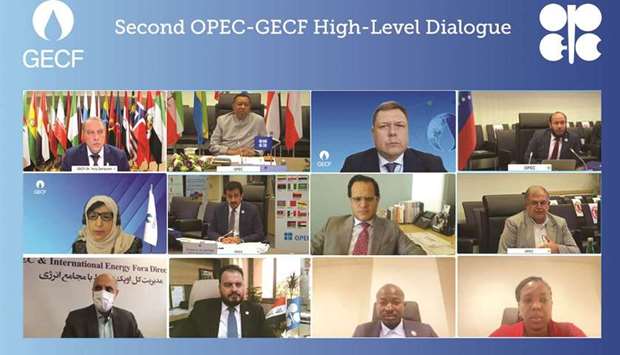The Organisation of the Petroleum Exporting Countries (Opec) and the Gas Exporting Countries Forum (GECF) held the Second High-Level meeting of the ‘Opec-GECF Energy Dialogue’ yesterday via videoconference.
The meeting was co-chaired by Yury Sentyurin, GECF secretary-general, and Mohamed Sanusi Barkindo, Opec secretary-general.
It noted the importance of crude oil and natural gas to the global economy and in meeting current and future energy demand, highlighting that both commodities will account for around half of the total global energy mix in the decades ahead.
“Together, Opec and GECF can count on their respective competencies to ensure that the global economy heals after the devastation of coronavirus and that a reliable and secure energy supply serves humanity like never before,” said Sentyurin.
“Notwithstanding the prevalent reductionism and the cancel culture, the GECF, together with stakeholders like Opec, aspires to present a balanced energy-transition roadmap to the international community for a constructive and informative debate. The GECF-Opec relationship in fact demonstrates the power of constructive debate to unlock the full potential of the world’s energy system.”
The Opec secretary-general highlighted the importance of the ongoing dialogue with the GECF, noting that it is crucial for the organisations of two vital energy sources to regularly co-operate and exchange views on pressing issues in the interest of global energy stability and sustainability.
“The bonds that bring our organisations together run far deeper than the geology that has linked oil and gas since the beginning of time,” Opec secretary-general stated, adding, “Today, it is of utmost importance that organisations like Opec and the GECF continue to work hand-in-hand to ensure that we remain in a strong position to provide secure, stable and sustainable supplies of energy.”
The secretary-generals shared a statement that oil and gas have an important role to play in the energy transition and support the need to reduce emissions, bolster efficiency and embrace innovation. It is therefore important to be aware of the risks of not adequately investing in the future of the oil and gas industries.
In implementing the memorandum of understanding signed in October 2019 in Moscow, the two intergovernmental organisations have been increasingly improving the accuracy of dataflow and analysis, strengthening the exchange of information and expertise, which dates back to mutual cooperation on JODI (Joint Organisations Data Initiative).
Both organisations now contribute to each other’s flagship publications — the World Oil Outlook and Global Gas Outlook 2050 — on a reciprocal basis.
From 2022, this practise is to be expanded to short- and medium- analysis of the global oil and gas markets’ development.

The meeting was co-chaired by Yury Sentyurin, GECF secretary-general, and Mohamed Sanusi Barkindo, Opec secretary-general.
